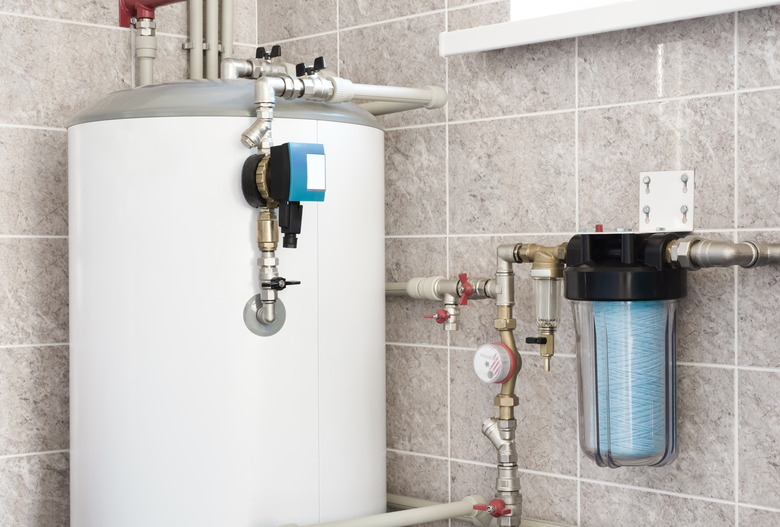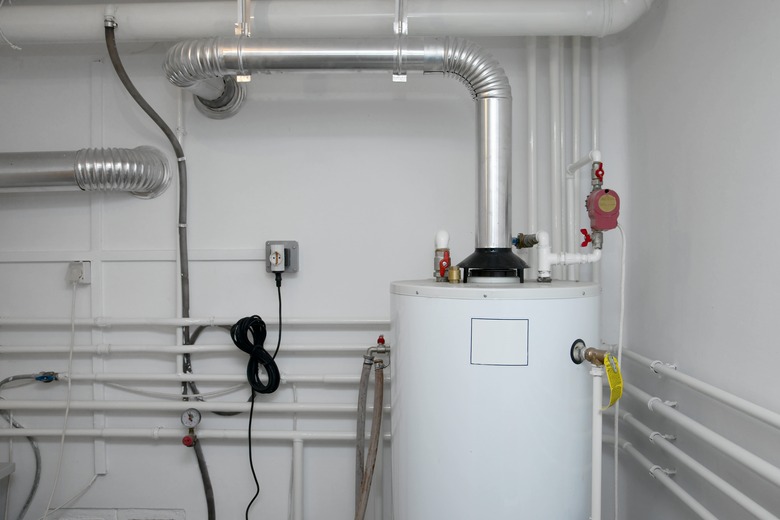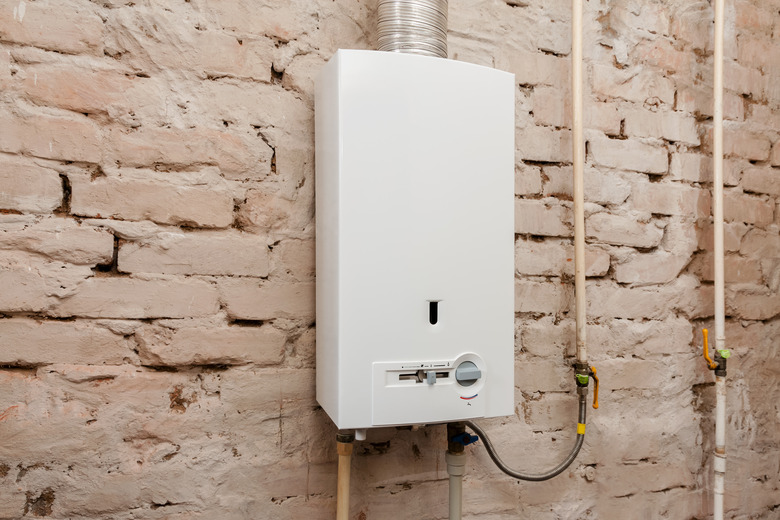What Does Boiler Installation Or Replacement Cost?
The cost for boiler installation or the replacement of a hot water or steam boiler for a residential heating system can vary enormously, which means that planning requires a considerable amount of research. National averages compiled by one trade organization shows an average price of $5,500 for boiler replacement, within a common range of $3,000 to $11,000. Another survey shows an average cost of $8,362 for installing a new boiler designed to heat an in-floor radiant system in a 2,000-square-foot home. These average prices are dependent on many, many variables, and costs can go a lot higher than this.
In a small, well-insulated, rambler-style home where there is no additional plumbing or gas line work needed, replacing a small natural gas boiler might cost less than $2,000. However, in a large, older home with substantial heating needs requiring a large boiler — and an underground oil tank that needs to be removed, asbestos insulation that must be abated, new boiler pipes that need to be plumbed and all-new radiators — you shouldn't be terribly shocked if the price tag comes in at $20,000 or more.
To get a ballpark idea of what a new boiler might cost before you call the contractor, you can look at how the different variables affect the overall cost.
Tip
The typical cost of a new boiler plus installation ranges from $5,500 to $8,362. Several factors can affect the cost, resulting in an overall range of $3,000 to over $11,000.
Heating Needs/Btu Capacity
Heating Needs/Btu Capacity
Boilers are rated according to the amount of thermal heat they produce, measured in British thermal units, or Btu. Although the Btu capacity affects costs less than other factors, in general, you'll find that the larger the boiler capacity, the more expensive it will be. For example, in a recent survey of boilers offered at a home improvement center, a 60,000 Btu medium-efficiency natural gas boiler sold for about $2,000, while a 150,000 Btu boiler with similar efficiency ratings sold for about $2,600. This is a familiar pattern with most boiler brands — the higher the Btu rating, the more expensive the boiler. So, while Btu capacity isn't the most important factor in determining price, it does affect the cost of a boiler.
Avoid the temptation to install a boiler that is oversized for the house. Some people think this makes for a more energy-efficient system, but while a large boiler will heat the water faster, such systems are actually less fuel-efficient than properly sized or even slightly undersized boilers.
Boiler Fuel Types
Boiler Fuel Types
Boilers for residential heating systems are most often powered by propane or natural gas, but they can also be powered by fuel oil, electricity or even wood.
A boiler that burns heating oil costs between $1,700 and $6,500, and the total price — including boiler installation labor costs — range from $4,000 to $9,000. They are generally a little more expensive than gas-fired boilers since they require the installation of a fuel tank — because fuel oil costs are gradually rising, fuel oil boilers are generally not the best choice unless you happen to live in a region where fuel oil is widely available and cheap. Currently, about 6 percent of United States homes burn heating oil in their furnaces and boilers, mostly in the Northeast.
Natural gas or propane is the most common choice for residential boilers. The cost for a boiler alone ranges from $1,200 to $8,000. When boiler installation is included, the total cost ranges from $3,800 to $12,000. Natural gas is a relatively cheap fuel (at least for the moment), so these boilers offer the best overall economy. Many boilers can be adapted for either natural gas or propane. Propane is a much more expensive fuel, but it is also considerably more efficient, so operating costs are not all that different. Propane is often the only choice for rural residents without access to natural gas utilities. Currently, about 49 percent of all homes in the U.S. burn natural gas for heating, while propane is used in about 5 percent of all homes.
Electric boilers range in cost from $800 to $7,000 for the boiler alone and $1,500 to $9,000 for the boiler plus installation. Electric boilers can be relatively inexpensive to buy and install, but the operating costs over the life of the boiler quickly make them much more expensive. They are probably not a good choice in most circumstances, though this could change if fossil fuels become more scarce. Electric boilers can be a good choice in relatively mild climates where winter temperatures aren't bitterly cold.
Wood-fueled boilers cost $5,000 to $14,000 for the boiler alone and $8,000 to $20,000 for the boiler plus installation. They are something of a novelty and are often installed outdoors by off-the-grid homeowners who have a large supply of their own wood. For those who have a free supply of wood, wood-fueled boilers might be an economical choice over the long run.
Hot Water or Steam Boiler
Hot Water or Steam Boiler
Residential boilers for heating systems can work by circulating water heated to about 180 degrees Fahrenheit through the pipes and radiators, or they can boil the water and turn it into steam, which then circulates through the pipes and radiators. The choice between a hot water or steam boiler is one you'll need to make early in the decision process.
A steam boiler typically costs more than a hot water boiler. In one industry survey, steam boilers average $2,500 to $9,000, while hot water boilers average $1,200 to $8,000. Further, steam boilers require more space since the units need to have room for the expanding steam. Given the choice, many experts view hot water boilers as the better choice since they are considered safer and easier to control and maintain. Hot water boilers can also be used to heat the water used for radiant floor systems or even the water used by hot water taps throughout the house.
However, before deciding to convert from an old steam boiler to a new hot water boiler, remember that you will likely incur costs for adapting or replacing the radiators as well as the boiler. If you already have an old steam boiler and the radiators and other parts are in good shape, then it's common to install a new steam boiler. There is one notable advantage with steam: It heats up the radiators much faster than water.
Standard or Combination Boiler
Standard or Combination Boiler
Today, new boilers can be combination units that both heat the home and supply hot tap water. Some can be used to heat the water for traditional radiators plus radiant flooring pipes plus hot tap water. Combination boilers (or combi boilers as they are often called) are more common in new construction, but some homeowners do convert to this type when replacing a boiler. They cost several hundred dollars more than standard boilers, but because they are essentially tankless water heaters, they save on water usage and heat water more efficiently than traditional water heaters. If you are converting to this type, however, you may be faced with some extra plumbing costs to connect the boiler to the tap water system or radiant floor piping.
Efficiency of the Boiler
Efficiency of the Boiler
Perhaps one of the biggest factors affecting the cost of a boiler is its fuel-efficiency rating, which is expressed in its annual fuel utilization efficiency, or AFUE, rating. Low-efficiency boilers are no longer available, so you will now have a choice between medium efficiency (defined as one with an AFUE rating of 80 to 89 percent) and high efficiency, which has an AFUE of at least 90 percent. A high-efficiency boiler, also known as a condensing boiler, can cost more than twice what a medium-efficiency boiler costs. High-efficiency condensing boilers start at about $3,000 compared to about $1,200 for the smallest standard medium-efficiency boilers.
The extra cost is due to the more sophisticated boiler design, which features a secondary heat exchanger to extract virtually all of the heat from the burning fuel as well as the installation of new vent pipes and other components. A high-efficiency boiler costs at least 30 percent less to operate, so over time, you will likely recoup the extra expense on your energy bills.
Actual savings on operating costs will depend on many factors, such as the amount of insulation and weathersealing of your home, but many estimates say that 4.5 to 10 years of fuel savings usually pay for the higher cost of a high-efficiency boiler when compared to a new medium-efficiency unit. If you presently have an older low-efficiency boiler, it's likely that a new high-efficiency model will cut your monthly fuel bills in half, so you can fairly easily calculate the payback period for your own situation.
Removal/Abatement Costs
Removal/Abatement Costs
Basic removal of an old boiler is usually figured into the contractor's bid for new boiler installation, but there are some circumstances where you might run into notable extra costs. If you have an old fuel-oil storage tank, for example, you may be required to remove it at a cost of up to $3,000 if the tank is buried.
If your old boiler or the water pipes are insulated with asbestos insulation, you will likely be required to have an abatement specialist safely remove this material. The cost for this can easily add $2,000 to $4,000 if there is extensive asbestos.
Sealed vs. Nonsealed Combustion
Sealed vs. Nonsealed Combustion
You have a choice between two types of combustion systems on gas and heating oil burners: sealed and nonsealed. The older-style, nonsealed combustion boilers take their air for burning the fuel from the interior of your home. With these, there is the potential for exhaust gases to leak into your home, though this is more likely to be a problem in modern homes that are tightly sealed. Nonsealed boilers typically cost $1,200 to $4,000.
Sealed systems, on the other hand, have a vent that brings in air from outdoors, making them more efficient and safe. Sealed boiler systems range in price from $1,200 to $8,000. The extra cost is partly the result of the extra vent piping that needs to be run.
Other Boiler Replacement Costs
Other Boiler Replacement Costs
There are also extra costs you can incur when a boiler is replaced.
- It's possible that the old chimney liner will be insufficient to handle the exhaust of the new boiler. If so, relining the chimney will involve extra costs. (High-efficiency condensing boilers require a different venting style, but these costs are normally part of the installation cost.)
- Most new boilers will require the installation of new gas lines — this is not a huge cost but remember to budget for it.
- It's normal to connect a new boiler to the existing pipes that bring hot water or steam to the existing radiators. However, if your system is quite old, it's possible that both the boiler pipes and the radiators will need to be replaced. You may also choose to do this simply because new, modern radiators are more stylish and more efficient. At the time contractors bid on your job, ask whether improvements to the boiler pipes and radiators are necessary. This can add several thousand dollars to the job cost.
References
- Homewyse: Fair Cost Guide – Energy Efficient Furnaces
- HomeAdvisor: How Much Does It Cost To Install Or Replace A Boiler?
- Remodeling Expense: Cost of High-Efficiency Gas Boilers
- Energy.gov: Furnaces and Boilers
- InspectAPedia: Tables Comparing Current Home Heating Costs
- Fixr: How Much Does It Cost to Install a New Boiler?


